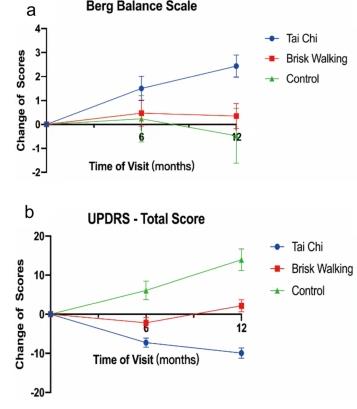I know what I will learning tomorrow. Tai Chi!
Mechanisms of motor symptom improvement by long-term Tai Chi training in Parkinson’s disease patients translationalneurodegenerat...
"To our interest, one-year Tai Chi training decreased the UPDRS-III score compared to baseline (baseline 25.20 ± 17.50 vs one-year 19.10 ± 9.56), while the motor symptoms became worse in the brisk walking group (baseline 17.50 ± 7.01 vs one-year 23.10 ± 7.81) and the control group (baseline 19.30 ± 4.87 vs one-year 30.70 ± 7.35). Since there was no statistical difference in the change of LEDD among the three groups (P = 0.939), which could exclude the impact of LEDD, this result indicated that Tai Chi training may have disease-modifying effects on PD."

